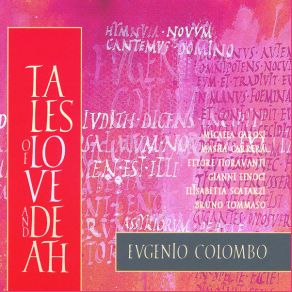Tales of Love and Death
Download links and information about Tales of Love and Death by Eugenio Colombo. This album was released in 2000 and it belongs to New Age, Jazz, Avant Garde Jazz genres. It contains 15 tracks with total duration of 01:07:38 minutes.

|
|
|---|---|
| Artist: | Eugenio Colombo |
| Release date: | 2000 |
| Genre: | New Age, Jazz, Avant Garde Jazz |
| Tracks: | 15 |
| Duration: | 01:07:38 |
| Buy it NOW at: | |
| Buy on iTunes $9.99 | |
Tracks
[Edit]| No. | Title | Length |
|---|---|---|
| 1. | Toxon: Polumetis | 5:56 |
| 2. | Toxon: Mnesteresin | 1:46 |
| 3. | Toxon: Etrapeto | 4:36 |
| 4. | Toxon: Zeus de Megal | 3:37 |
| 5. | Two Little Indians | 7:10 |
| 6. | Giuditta: Tunc | 6:51 |
| 7. | Giuditta: Incipite Domino | 4:03 |
| 8. | Giuditta: Venit Assur | 6:40 |
| 9. | Giuditta: Et Juvines | 0:43 |
| 10. | Giuditta: Dominus | 4:59 |
| 11. | Giuditta: Non Enim | 1:11 |
| 12. | Giuditta: Sed Judith | 9:52 |
| 13. | Giuditta: Horruerunt | 4:39 |
| 14. | Giuditta: Hymnum | 4:46 |
| 15. | Giuditta: Montes a Fundamentis | 0:49 |
Details
[Edit]Behind Tales of Love and Death lies a simple idea that had rarely been put to such convincing use: to bring together jazz and operatic singing. Eugenio Colombo brought his current quartet to the studio (Colombo on saxophones and flutes, Gianni Lenoci on piano, Ettore Fioravanti on drums, Bruno Tommaso on bass) along with Micaela Carosi, Masha Carrera, and Elisabetta Scatarzi, three classically trained opera singers. Tales of Love and Death comprises two Colombo compositions: "Toxon," based on a scene from The Odyssey, and "Giuditta," based on the apocryphal Book of Judith. A Colombo/Tommaso improvisation serves as an interlude. "Toxon" opens on a jazz-rock number very reminiscent of Canterbury prog rockers Hatfield and the North, but soon the music shifts to a ground where contemporary classical, Verdi, tango, and avant-garde jazz meet. Inspired by the ancient themes of Greek Gods and the Bible, Colombo embedded his music with some of the spirit of ancient ritualistic music, both profane and sacred. The listener catches references (actually, more moods than references) to African tribal music, Italian pagan songs, and religious chants. Therefore, the music shifts from solemn to cheerful, but always remains deep and somewhat serious. More than a genre exercise, this is breakthrough material, genre-bending, ears-opening. The only comparable work would be Canadian singer Karen Young's "Canticum Canticorum," where she blended Arabic traditional music with jazz and contemporary classical in a large-scale work based on this book from the Bible. The idea was similar but the results are quite different, with Colombo being jazzier and avant-gardist. Strongly recommended, especially for jazz listeners with an ear for operatic voices. ~ François Couture, Rovi